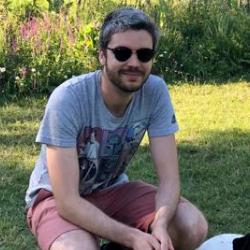Department of Biochemistry
Biography
I was born in Faial, one of the nine islands of the Portuguese archipelago of the Azores. When I was 3 months old, my parents moved to the sunny Algarve where I lived until I moved to Lisbon, to study Molecular Biology and Genetics for my undergraduate studies. I then took a MSc degree in Bioinformatics and Computational Biology and did my thesis work in Instituto de Medicina Molecular (IMM) studying the transcriptomics of Plasmodium falciparum, the parasite that causes Malaria in humans. I stayed in the same lab for an additional year as a research assistant which gave me the chance of spending a 2-month period in the Institut Pasteur in Paris. At this stage I already knew that I wanted to have an experience abroad which made me apply to the BBSRC DTP Programme of the University of Cambridge. After one rotation in Phil Zegerman's lab I decided to stay for my PhD project, where I have been for the past 3.5 years studying how the temporal pattern of DNA replication affects gene expression and chromatin organisation, using yeast genetics and bioinformatics. I have recently finished my PIPS at Illumina as a Bioinformatician in the Systems Analysis Group. My project consisted on an analysis of the root cause and impact of sequence specific errors (SSEs), which is an area of great interest and practical use to the company - SSEs consist of regions of the genome which are hard to sequence due to their sequence context (e.g., G-quadruplexes, homopolymers, inverted repeats, among others). SSEs are the main limitation to the complete sequencing of the genome and contribute disproportionally to the overall error rate. I am very grateful to BBSRC and the Cambridge Trust for providing me with the opportunity to do both high impact research and experience R&D in an industry environment. I am looking forward to the next step!
Research
Project Title:
The role of DNA replication timing on the establishment of gene expression and chromatin organisation patterns
Project Summary:
Eukaryotic DNA is duplicated according to an evolutionary conserved temporal pattern. This pattern of DNA replication is altered during development and differentiation and can be dysregulated in cancers. While temporal changes in genome duplication are associated with altered transcription and chromatin organisation, it is still unknown whether DNA replication timing is a cause or a consequence of cellular fate changes. Using budding yeast Saccharomyces cerevisiae strains whose replication timing programme can be conditionally altered, this project aims to understand the biological importance of a defined pattern of genome replication. Our results show that global changes in replication timing have a genome-wide effect in transcription and chromatin organisation. Moreover, we have found that chromatin conformation is perturbed in transcription-factor (TF) binding sites, which led us to follow the hypothesis that DNA replication timing evolved to ensure the correct TF binding dynamics during the cell-cycle. We have analysed TF binding genome-wide and have found that perturbations in replication timing affect the TF binding landscape. We believe this project will increase our knowledge of DNA replication regulation and its coordination with the genome structure and function.
Publications
Johnson, MC, Can, G, Santos, MM, Alexander, D, Zegerman, P. (2021). Checkpoint inhibition of origin firing prevents inappropriate replication outside of S-phase. Elife.
Teaching and Supervisions
Dr Philip Zegerman


